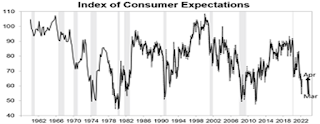Retail sales are rising 5.5 percent YoY, which is a sign that the economy is still booming, and the possibility of a recession years away. That is, if inflation begins to taper of its own accord, which consumers think it will, despite the Ukraine war-induced sanctions.
Former Treasury Secretary Larry Summers doesn’t think it will, which is why he says a recession is “the most likely thing” partly because the Federal Reserve “is going to have to keep going [in its effort to subdue inflation] until we see disinflation.”
Summers has been the main inflation hawk, whereas Janet Yellen the current Treasury Secretary and past Chair of the Federal Reserve was more optimistic that the U.S. economy could escape a recession as it begins to raise interest rates.
Half of the inflation number is volatile gas prices. Gas sales rose 8.9 percent in the retail report, pushing up gas prices more than 8 percent, while auto sales fell -1.9 percent, signaling that car makers are catching up to demand and car prices moderating.
So even though the inflation rate has soared to 8.5 percent, consumers are increasingly optimistic about their future. The University of Michigan’s gauge of consumer sentiment rose in April to 65.7, a more than 10 percent increase from March’s reading of 59.4,
Consumer Sentiment jumped by a surprising 10.6% in early April, although it remained below January's reading and lower than in any prior month in the past decade, said the University of Michigan’s press release. Nearly the entire gain was in the Expectations Index, which posted a monthly gain of 18.0%, including a leap of 29.4% in the year-ahead outlook for the economy and a 17.2% jump in personal financial expectations.
The reason for their increasing optimism was plentiful jobs and rising wages. Consumers under the age of 45 expect a 5.3 percent increase in their wages this year, almost enough to keep up with inflation expectations.
“Consumers still anticipate that the national unemployment rate will inch downward, acting to improve consumers’ outlook for the national economy,” Richard Curtin, the survey’s chief economist wrote.
U.S. Treasury Secretary Janet Yellen is also more cautiously optimistic than Larry Summers re the inflation outlook. She said on Wednesday the Federal Reserve would need luck and skill to maintain a strong labor market while bringing inflation down, or in economists’ terms to engineer a “soft landing.”
“It has been done in the past. It’s not an impossible combination,” Yellen said, during a talk at the Atlantic Council. Yellen said she was more worried about the prospects of a recession in Europe given the impact of the war in Ukraine than one in the U.S..
Americans anticipated gasoline prices to remain steady over the next year, which is in line with their overall outlook that inflation will moderate, said the sentiment survey. Americans’ expectations for overall inflation over the next year held steady at a 5.4 percent inflation rate in March while expectations for inflation longer term over the next five years has remained at 3.0 percent for many months.
Another reason for optimism concerning a “soft landing” as the Fed begins to raise interest rates, is that industrial production is soaring, which also helps bring down inflation.
The Federal Reserve just reported that industrial production jumped 0.9 percent in March. and February’s gain was revised up to 0.9 percent from the initial estimate of a 0.5 percent increase. For the first quarter, output was up at an 8.1 percent annual pace, with the output of motor vehicles and parts up 7.8 percent in March.
So supply chains are beginning to catch up to demand, another reason that inflation may moderate, and consumers’ optimism is warranted. But it will require considerable “luck and skill” to avoid a recession, as well as a favorable outcome to the war in Ukraine.
Harlan Green © 2022
Follow Harlan Green on Twitter: https://twitter.com/HarlanGreen



No comments:
Post a Comment